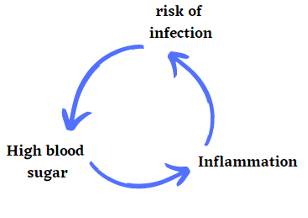There are 29.1 million Americans living with diabetes. That’s almost 10% of the population! For diabetics, high blood sugar can take a toll on the entire body — including the teeth and gums. High blood sugar may also cause dry mouth and make gum disease worse. Because having less saliva allows more tooth-decaying bacteria and plaque to build up, it is essential for diabetics to control their blood sugar and get routine dental checkups. With good blood sugar control and dental care, you can minimize these problems.
A diabetes primer
Diabetes occurs when a person’s blood glucose (or blood sugar) is too high. Blood glucose is your main source of energy and comes from the food you eat. If you have diabetes, your body either doesn’t make enough insulin or can’t use the insulin it makes as efficiently as it should. Insulin is a hormone that is made by cells in the pancreas. It controls the amount of sugar in the blood. When there isn’t enough insulin, too much blood sugar stays in your bloodstream, potentially causing serious health problems. An A1C test is a relatively simple blood test that gives you a picture of your average blood sugar level over the past few months. The higher the levels, the greater your risk of developing diabetes complications.
Oral health effects of inflammation
Researchers have learned that diabetics tend to have higher levels of inflammation in their bodies. Inflammation, high blood sugar, and therefore a higher A1C result can increase your body’s risk of infections and dental-related problems, including:
- Tooth decay (cavities)
- Early gum disease (gingivitis)
- Advanced gum disease (periodontitis)
- Thrush (yeast)
- Dry mouth
An assessment by the ADA based on substantial research notes that diabetes is a risk factor for gingivitis and periodontitis, and it may also increase risks of ongoing periodontal damage over time. Research also shows that gum disease can make it more difficult to control blood sugar. And thus begins a vicious cycle. Infections can cause your blood sugar to rise. This rise in blood sugar increases inflammation. The increase in inflammation can increase risk of infection.
Getting oral infections and gum disease under control can help treat diabetes and lower A1C levels. Patients with both gum disease and high levels of A1C will see a reduction in their A1C once the gum disease is treated — even if nothing else is changed.
Diabetes and … {gulp}… the holidays!
During the holidays it is easy to be tempted to partake in fare including fatty meats and cheeses, fried foods and sweets. While restraint is advisable for everyone, making smart choices can help prevent inflammation and related risks associated with diabetes. With minor adjustments to standard recipe ingredients or creative diabetes-friendly recipes, you can relax and enjoy the holidays. View this selection of healthy and festive alternatives.
Minimizing inflammation
Patients with diabetes should be monitored more frequently to minimize inflammation and control gum disease or oral infections. Regular dental visits are the single most important thing diabetics can do for their oral health. In fact, those with diabetes should have dental checkups at least twice per year.
If you are concerned about visiting our office during these challenging times, we want to provide assurance that your safety is our number one priority. We have implemented extra safety measures to keep you safe and healthy, including installation of Surgically Clean Air’s JADE Air Purifier Systems, the most advanced medical grade systems on the market. And we abide by strict protocols for everyone in our office.


